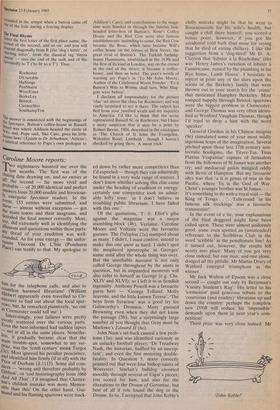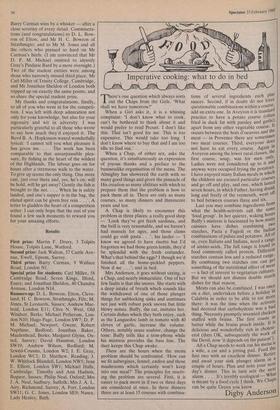Caroline Moore reports:
To nightmares haunted me over the ilt months. The first was of the closing date drawing on, and no entries at the second — far more vivid and Probable — of 20,000 identical and perfect a nswers from 20,000 erudite and ferocious- 1Y energetic Spectator readers. In the event, 153 entries were submitted; and these — almost without exception — got the main towns and their anagrams, and decoded the final answer correctly. Most, t(30, did extremely well in identifying the allusions and quotations within these parts: ,MY dread of your erudition was well- 'Minded. As for your energy — the unfor- tunate Viscount De L'Isle (Penshurst Nee) can testify to that. My apologise to him for the telephone calls, and also to ectuntless harassed librarians! (William Hibbert apparently even travelled to Cir- encester to find out about the local spar- 1.0‘vs; but, he remarked plaintively, `no one In Cirencester could tell me'.) Interestingly, your failures were pretty evenly scattered over the various parts. "en the best-informed had sudden lapses not at all in the same places. Nonethe- less, it gradually became clear that the main trouble-spot, somewhat to my sur- prise, was the 'tenth century' monk Turgot /(3c). Most ignored his peculiar prescience, and identified him firmly (if at all) with the Prior of Durham (d.1115). Some did com- ment — `wrong and therefore probably by Gibbons; or `cod historiography from 1066 And All That'. I'd imagined that Chatter- ton's childish mistake was more Memor- able than this! On the other hand, Gur- Mund and his flaming sparrows were track-
ed down by rather more competitors than I'd expected — though they can admittedly be found in a very wide range of sources. I don't know whether solving this clue came under the heading of erudition or energy: certainly one competitor took an admir- ably lofty tone: `as I don't believe in troubling public librarians, I have failed with this one.'
Of the quotations, T. S. Eliot's gibe against the magazine was a major stumbling-block (4b). Verlaine, Caroline Moore and Voltaire were the favourite guesses. The Polyglots (2a) stumped about as many. I didn't, I must confess, intend to make this one quite as hard: I didn't spot the misplaced apostrophe in Georges' name until after the whole thing was over. But the unreliable narrator is not only called George throughout by the aunts in question, but in unguarded moments will also refer to himself as George (e.g. Chs. XLIV and XLVI); so I left it in as fiendish ingenuity. Anthony Powell was a favourite guess here — `George Tolland, Molly Jeavons, and the little known Teresa'; `The boys from Syracuse' was a good try for Galsworthy's Dromios. Many guessed Browning even when they did not know the passage (3b); but a surprisingly large number of you thought that Gray must be Marlowe's Edward 11(6c).
John Nash's set-back caused a few prob- lems (3a); and was identified variously as an unlucky football player; `Dr Treadway Nash, the historian, baffled by an inscrip- tion'; and even the first motoring double- fatality. In Question 5, many correctly pointed out that were four bishop-saints of Worcester. Sinclair's bulldog cavorted moodily through several of Elgar's pieces;
you scored for him, and also for the alterations to the Dream of Gerontius, but best of all if yOu found the dog in the Dream. In 6a, I accepted that John Keble's
chilly mistake might be that he went to Bournemouth for his wife's health, but caught a chill there himself; you scored a bonus point, however, if you got his accidental cold bath (but none for saying that he died of eating chillies). I like the suggestion from a `dog-tired' Mr D. A.
Clayton that `lobster a la Riseholme' (6b) was `Henry James's variation of lobster a Isamericaine, ruined by the plumbing in his Rye home, Lamb House'. I hesistate to repeat in print any of the slurs upon the scions of the Berkeley family that were thrown out in your search for the `crime' that rusticated Humphry Berkeley. Most romped happily through Bristol; sparrows were the biggest problem in Cirencester; and George Thomas was very often identi- fied as Wynford Vaughan-Thomas, though I'd tried to drop a hint with the word `speaker'.
General Gordon in his Chinese insignia (9c) stimulated some of your most wildly ingenious leaps of the imagination. Several pitched upon those late 17th century aris- tocratic hooligans, the Tityre-Tus. Titus Flavius Vespanius' capture of Jerusalem froni the followers of St James was another try; and mediaeval guilds mingled oddly with Bevis of Hampton. But my favourite idea was that `a ti is genus of tree in the Pacific, where Tu is the God of War.
Christ's younger brother was St James. . . . It's something to do with a royal visit — the King of Tonga . . .s. Talleyrand `in his famous silk stockings' was a favourite transvestite!
In the event of a tie, your explanations of the final doggerel might have been called upon. These were almost uniformly good: some even spotted an (unintended) reference to the Scriblerus Club in the word 'scribble' in the penultimate line! As it turned out, however, the results fell neatly into place. Many of you got very
close indeed; but one man, and one alone, dodged all the pitfalls. Mr Martin Drury of Watford emerged triumphant as the winner.
Mr Jack Walton of Epsom was a close second — caught out only by Betjeman's `Varsity Student's Rag'. His letter to his
`tormentor' paid generous tribute to the `courteous (and erudite)' librarians up and down the country: perhaps the complete new DNB will reduce his 'impossible' demands upon them in next year's com- petition!
Third prize was very close indeed. Mr 'John Keble!' Barry Carman wins by a whisker — after a close scrutiny of every detail. Commisera- tions (and congratulations) to D. L. Bow- ron of Elton, and Mr H. C. Bowron of Strathmiglo; and to Mr M. Jones and all the others who pressed so hard on Mr Carman's heels. (I am convinced that Mr D. P. M. Michael omitted to identify Gray's Pindaric Bard by a mere oversight.) Two of the student entries were among those who narrowly missed third place. Mr Carl Miller of Trinity College, Cambridge, and Mr Jonathan Sheldon of London both tripped up on exactly the same points; and so share the special student prize.
My thanks and congratulations, finally, to all of you who went in for the competi- tion. I was left with deep admiration not only for your knowledge, but also for your ingenuity and wit in adversity. I was particularly grateful to all those who wrote to say how much they'd enjoyed it. The Revd B. A. Hopkinson waxed wonderfully lyrical: cannot tell you what pleasure it has given me. . . . The work has been comparable to that unsurpassable plea- sure, fly fishing in the heart of the wildest of the Highlands. The labour goes on for hours after a strenuous walk to the water. To give up seems the only thing. One more cast, just over there and, yes, he's on; will he hold, will he get away? Gently the fish is brought to the net. . . . When he is safely landed, and one's supper is in the bag, the elated spirit can be given free rein . .'. A letter to gladden the heart of a competition setter: I can only hope that the rest of you found a few such moments to reward you for your amazing efforts.
Results
First prize: Martin F. Drury, 3 Tolpits House, Tolpits Lane, Watford.
Second prize: Jack Walton, 57 Castle Ave- nue, Ewell, Epsom, Surrey.
Third prize: Barry Carman, 9 Wallace Road, London N1.
Special prize for students: Carl Miller, 58 Cambridge Road, Seven Kings, Ilford, Essex; and Jonathan Sheldon, 40 Chandos Avenue, London N14.
Runners-up: D. L. Bowron, Elton, Cleve- land; H. C. Bowron, Strathmiglo, Fife; M. Jones, St Leonards, Sussex; Andrew Mac- leod, London Eli; Clive N. West, Old Windsor, Berks; Michael Petheram, Lon- don N10; Hugo Page, London SW7; D. P. M. Michael, Newport, Gwent; Robert Napthine, Bedford; Jonathan Baker, Maidenhead, Berks; Margaret Glynn, Ox- ted, Surrey; David Haunton, London SW19; Andrew Wilson, Bedford; M. Szwed-Cousins, London W2; I. E. Gray, London WC1; D. Matthew, Reading; J. W. Whitlock Blundell, London NW5; Jean E. Elliott, London SW1; Michael Halls, Cambridge; Timothy and Ann Hudson, Bognor, Sussex; Philip Neal, Oxford; Mrs J. A. Neal, Sudbury, Suffolk; Mrs J. A. L. Airy, Richmond, Surrey; A. Fort, London SW11; G. C. Jones, London SE9; Nancy, Lady Henley, Bath.











































 Previous page
Previous page